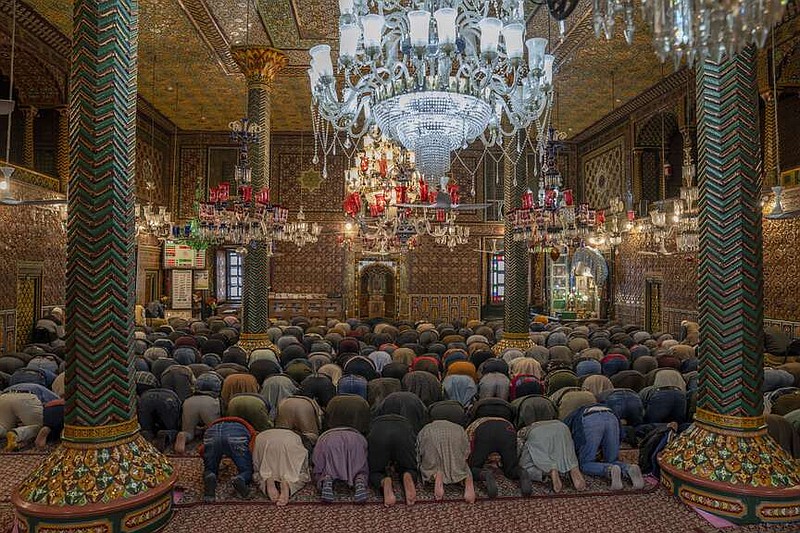Fasting is a common form of worship among the various religions across the world. Islam places great importance on the act of fasting, calling it one of the pillars of worship, along with prayer, charity and pilgrimage.
God says in the Quran, "You who believe, fasting is prescribed for you, as it was prescribed for those before you, so that you may be mindful of God" (2:183).
Ramadan is the ninth month of the Islamic lunar calendar. During this month, Muslims worldwide are obligated to abstain completely from food, drink and sexual relations from dawn to dusk, culminating in a release of restrictions at sunset. The fast, as per the teachings of Prophet Muhammad (peace be upon him), is broken with dates followed by a meal which varies from culture to culture.
However, fasting is not mandatory on those for whom it would constitute a difficulty. For instance, people who are sick or traveling can postpone their fast until their illness or journey is over. The elderly, the weak, the mentally ill and those who have a chronic illness that prevents them from fasting, are all exempted during Ramadan. They may feed a needy person for every missed day, if they can afford to do so.
Fasting is observed as an act of obedience to God. The fasting person is rewarded manifolds for all good deeds. In addition, whoever fasts and prays during Ramadan with pure intentions will have their past sins forgiven.
Fasting in Ramadan: Physical, Spiritual, and Social Benefits
Prophet Muhammad (peace be upon him) taught his followers to remain conscious of the deeper significance behind their fast, saying, "Whoever does not abandon falsehood in word and action, then God has no need that they should leave their food and drink."
Therefore, fasting is multidimensional – along with the physical aspects of fasting, one must nurture the social and spiritual elements as well in order to fully benefit from fasting.
In essence, fasting in the month of Ramadan is a yearly opportunity for Muslims to physically and spiritually revive themselves. Fasting redirects the heart away from worldly affairs and towards the remembrance of God. During Ramadan, Muslims focus on strengthening their relationship with their Creator. The self-restraint practiced in Ramadan makes the heart and mind accustomed to the remembrance of God and to the obedience of His commandments.
Fasting during Ramadan is, therefore, a spiritual regimen and a reorientation for the body and mind. It is a time for spiritual reflection, prayer and good deeds. The spiritual cleansing during the month of Ramadan results in renewed determination to worship God throughout the year.
Fasting is intended to instill self-discipline, empathy and compassion in the individual. Muslims are motivated to increase their generosity during this month. They are encouraged to share the blessings that God has provided them by giving generously in charity because wealth is regarded as a trust from God.
Indeed, fasting makes people more aware of the many bounties of God. Experiencing hunger and thirst allows us to feel the desperation of hunger and leads us to empathize with those who don't know when they will eat their next meal.
Fasting: A Strength Not a Weakness
Muslim athletes keep up with practice and play games despite fasting. Hakeem Olajuwon, a retired NBA professional basketball player, was widely recognized for not only playing basketball during Ramadan, but also playing well. In February, 1995, he was named the NBA Player of the Month; incidentally, Ramadan that year began on Feb. 1. Olajuwon has been the inspiration for many other players who manage to perform on the field or in the court with gusto even when they last had any water or food hours ago.
When the month of Ramadan arrives, it brings a heightened sense of community with it. Muslim families often wake up together before sunrise for an early breakfast. They also invite one another to break their fast together, which creates friendship and stronger ties among neighbors, families and friends. Many people also bring meals to mosques to share with the community, especially the poor, the needy, the travelers and those who do not have families. Together, they also make it a point to go to the mosque for the nightly Ramadan prayers.
The Month of Quran
God began revealing the Quran to Prophet Muhammad (peace be upon him) during Ramadan in the year 610 C.E. The Quran, the final revelation from God, is often read and memorized in its original Arabic language, preserving the divine order and structure of this book. In Ramadan, Muslims are encouraged to focus as much time as possible on reading, listening and understanding the Quran as a means of coming closer to God.
One of the ways Muslims become nearer to the Quran during Ramadan is through extended congregational prayers offered in the late evening after the breaking of the fast. Over the course of the month, the entire Quran is commonly recited in these night prayers. This is an opportunity for Muslims to become spiritually connected to God and reflect on His words of guidance.
Even as the day's routine of work and home continue, Muslims make extra time for spiritual nourishment and self-introspection. Commitments ranging from the recitation and study of Quran to increased charity to nightly attendance of additional prayers are commonly made to reap the rewards of the fasting month.
Eid-ul-Fitr Celebration
The end of Ramadan is followed by a day of celebration or holiday known as Eid-ul-Fitr.

